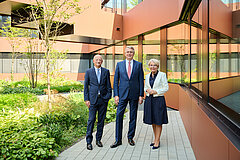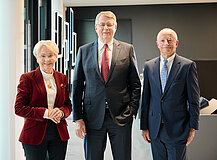RAG-Stiftung successfully completes the first year of its financing obligations and remains on track during the coronavirus crisis

The Board of Executives of the RAG-Stiftung published the figures for the financial year 2019 today. The results show that the foundation model lived up to expectations on all counts during the first year in which it had to finance the perpetual obligations of the German coal mining industry. Moreover, the foundation has remained on track during the coronavirus crisis.
“At 291 million euros, the costs of the perpetual obligations were slightly lower than the 300 million euros that had been expected,” said Bernd Tönjes, Chairman of the Board of Executives of the RAGStiftung, with satisfaction. During the annual press conference at the World Heritage site Zollverein, the Board of Executives announced that the foundation also had a very successful financial year in 2019. It once again achieved a record annual profit of 474 million euros (previous year: 454 million euros). At the end of 2019, the foundation held assets worth 18.7 billion euros.
In 2020, the RAG-Stiftung initially got off to a good start, although, like the economy as a whole, it was then impacted by the effects of the coronavirus pandemic. However, Tönjes emphasized that “the RAG-Stiftung continues to be robust and crisis-proof during the coronavirus crisis. The impact on our investment pool was and still is manageable. The diversification of our portfolio pays off particularly well in turbulent times like these.”
Dr. Jürgen Rupp, Chief Financial Officer of the RAG-Stiftung, was also confident: “Last year showed that the foundation model works as it should. This year has shown us that the foundation is stable even during an economic crisis.” In 2019 the RAG-Stiftung continued to decrease its dependency on Evonik. Whereas Evonik now accounts for only 44 percent of the foundation’s total assets, 49 percent of the RAG Stiftung’s total income already comes from other investments. In 2019 the foundation invested an additional 1.2 billion euros in globally diversified asset classes. Additional investments of over 650 million euros were added between January and April 2020. Dr. Rupp also underscored the growth in hidden reserves (up by 690 million euros in 2019), which enable the foundation to meet its obligations towards RAG at all times. “They also allow us to respond to developments with a steady hand in times of crisis and to make decisions for our portfolio after careful deliberation,” said Rupp.
However, the Board of Executives of the foundation sees a considerable need for improvement with regard to the requirements of the German Commercial Code (HGB) for the accounting of long-term obligations. These requirements substantially affect RAG and thus also the RAG-Stiftung through a control and profit-and-loss transfer agreement. Consequently, the Board of Executives calls for a regulation specifying a fixed interest rate and thus increased predictability and reduced strain on results. This would also be beneficial during the current crisis for all of the companies that prepare their accounts in accordance with the German Commercial Code (HGB).
The main area in which the foundation provides financial support continues to be the education of disadvantaged children and teenagers. The foundation has established its own flagship projects along the entire educational chain, stated Bärbel Bergerhoff-Wodopia, member of the RAG-Stiftung Board of Executives responsible for human resources and the funding areas of education, science and culture. “Since its creation, the foundation will have invested a total of about 120 million euros in various support projects by the end of 2020. With this money, we have been able to sustainably do a lot of good in the former mining regions,” she added. However, the coronavirus crisis also poses major challenges for many of the organizations that receive support from the RAG-Stiftung. Bärbel Bergerhoff-Wodopia emphasized that the RAG-Stiftung will assist these organizations especially in such difficult times. “We are and will remain a reliable partner!” she said.

